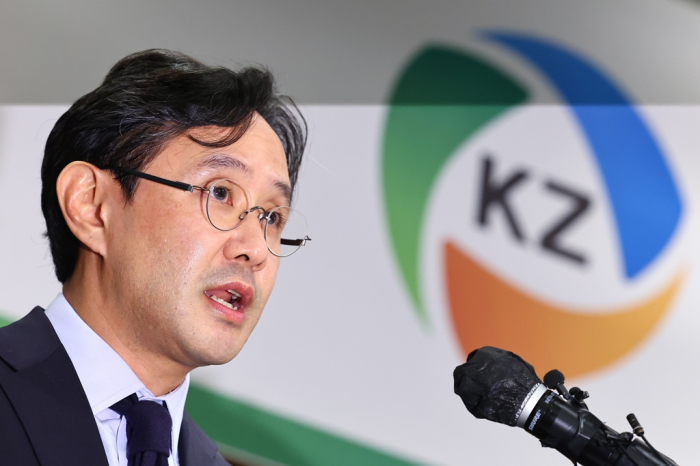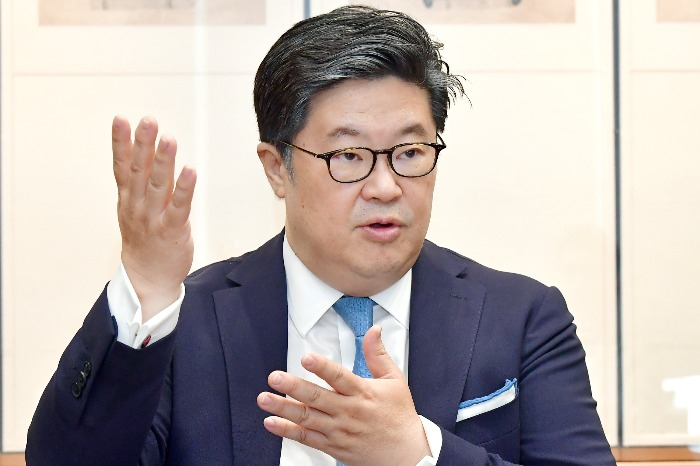Korea Zinc, MBK-Young Poong alliance to fight over cumulative voting
Meanwhile, the National Pension Service recently slashed its stake in Korea Zinc from 7.49% to 4.51%
By Jan 06, 2025 (Gmt+09:00)
LG Chem to sell water filter business to Glenwood PE for $692 million


KT&G eyes overseas M&A after rejecting activist fund's offer


Kyobo Life poised to buy Japan’s SBI Group-owned savings bank


StockX in merger talks with Naver’s online reseller Kream


Meritz backs half of ex-manager’s $210 mn hedge fund



The battle over Korea Zinc Inc.'s management control between Korea Zinc Chairman Choi Yun-birm and the Young Poong Corp.-MBK Partners alliance has now boiled down to a vote on the introduction of a cumulative voting system at Korea Zinc's extraordinary shareholders' meeting on Jan. 23.
The upcoming shareholder meeting has drawn interest in whether the proposed adoption of a cumulative voting system — viewed as Chairman Choi's last hidden card to defend managerial control — will succeed.
Its chances of success appear to be slim, however, analysts said.
The chairman of the National Pension Service (NPS) Trustee Responsibility Committee, a major Korea Zinc shareholder that holds a casting vote, has expressed opposition to the system. Minority shareholders are also hesitant, as the advantages of implementing the system for Korea Zinc’s ownership structure appear limited.
According to investment banking industry sources on Monday, the 3% rule will apply to the cumulative voting system proposal at Korea Zinc's shareholders' meeting. The 3% rule restricts voting rights to 3% of shares on certain issues, regardless of total shares held.

Young Poong, a major shareholder of Korea Zinc, the world’s largest lead and zinc smelter, has joined hands with MBK Partners, a private equity firm focused on Northeast Asia, to buy more Korea Zinc shares in order to acquire a controlling stake in the company — a tender offer that began Sept. 13.
In its defense against the bid, Korea Zinc Chairman Choi has partnered with US private equity firm Bain Capital.
The Young Poong-MBK consortium has steadily increased its stake in Korea Zinc to 40.97%. The stake is shared by Young Poong (25.42%), MBK’s special-purpose company Korea Corporate Investment Holdings (7.82%) and the alliance's advisor Jang Hyung-jin (3.49%). However, their voting rights on the cumulative voting proposal will be limited to 3% each due to the rule.
CUMULATIVE VOTING SYSTEM
The cumulative voting system allows shareholders to allocate their votes based on the number of directors being elected. For example, if three directors are to be appointed, each share is granted three votes, which can all be assigned to a single candidate or distributed among several candidates. This mechanism is seen as advantageous for minority shareholders rather than majority shareholders.

"The cumulative voting system enables minority shareholders to concentrate their voting rights on one or more specific candidates, thereby enhancing their influence. This could serve as a check against the dominant shareholders — including the current management led by Chairman Choi and major stakeholders such as Young Poong and MBK Partners — shaping the board entirely to their preference. It also helps ensure that decisions are made in the interest of all shareholders," said a Korea Zinc official.
While the system aims to protect minority shareholders, it may not apply in Korea Zinc’s case, analysts said.
The Young Poong-MBK consortium and Chairman Choi’s friendly shareholders control about 75% of Korea Zinc. Excluding Korea Zinc’s treasury shares and the stake owned by the NPS, minority shareholders are estimated to hold only 7-8% of the company’s shares. Even with unified support, minority shareholders might struggle to appoint a board member via the cumulative voting system.
NPS OPPOSES THE SYSTEM
Meanwhile, the state-run pension fund has reduced its Korea Zinc stake from 7.49% in March 2023 to 4.51% as of October, taking profits from the stock's sharp share price hikes during the management dispute.

Han Seok-hoon, head of the NPS' Trustee Responsibility Committee, opposes the cumulative voting system. In 2018, he criticized the system for potentially decreasing managerial efficiency and risking corporate information leakage, deeming it outdated. More recently, he said the system deviates from the "one-share-one-vote" principle.
Chairman Choi's friendly shareholders, including Hanwha Corp. and Hyundai Motor Co., also oppose the system.
Korean conglomerates have opposed the system, citing increased vulnerability to foreign funds targeting managerial control. Last November, conglomerates including Samsung, SK, Hyundai Motor and LG, opposed a legislative proposal mandating the system for listed companies with assets exceeding 2 trillion won.
Notably, Hyundai Motor rejected a similar proposal by activist fund Elliott Management in 2018. Hanwha is exploring ways to remove such a system after acquiring Daewoo Shipbuilding & Marine Engineering, since renamed Hanwha Ocean Co., which favors the cumulative voting system.
The Young Poong-MBK consortium has filed an injunction to block director appointments through the cumulative voting system. If the injunction request is accepted by a Seoul court, director appointments in favor of Chairman Choi will be impossible, analysts said.
Write to Jong-Kwan Park and Byeong-hwa Ryu at pjk@hankyung.com
In-Soo Nam edited this article.
-
 Mergers & AcquisitionsMBK, Young Poong close in on majority of Korea Zinc
Mergers & AcquisitionsMBK, Young Poong close in on majority of Korea ZincDec 19, 2024 (Gmt+09:00)
2 Min read -
 Mergers & AcquisitionsKorea Zinc’s role questioned in SM Entertainment stock manipulation case
Mergers & AcquisitionsKorea Zinc’s role questioned in SM Entertainment stock manipulation caseNov 28, 2024 (Gmt+09:00)
3 Min read -
 BatteriesSouth Korea approves Korea Zinc’s precursor as national core technology
BatteriesSouth Korea approves Korea Zinc’s precursor as national core technologyNov 19, 2024 (Gmt+09:00)
2 Min read -
 Mergers & AcquisitionsKorea Zinc chair hatches plan to maintain management control
Mergers & AcquisitionsKorea Zinc chair hatches plan to maintain management controlNov 18, 2024 (Gmt+09:00)
long read -
 Mergers & AcquisitionsKorea Zinc drops $1.8 bn rights issue to regain shareholder support
Mergers & AcquisitionsKorea Zinc drops $1.8 bn rights issue to regain shareholder supportNov 13, 2024 (Gmt+09:00)
4 Min read -
 Mergers & AcquisitionsMBK Partners tipped to win battle for control of Korea Zinc
Mergers & AcquisitionsMBK Partners tipped to win battle for control of Korea ZincNov 12, 2024 (Gmt+09:00)
2 Min read -
 Mergers & AcquisitionsMBK’s Korea Zinc bid aimed at corporate governance, shareholder value
Mergers & AcquisitionsMBK’s Korea Zinc bid aimed at corporate governance, shareholder valueNov 05, 2024 (Gmt+09:00)
2 Min read


